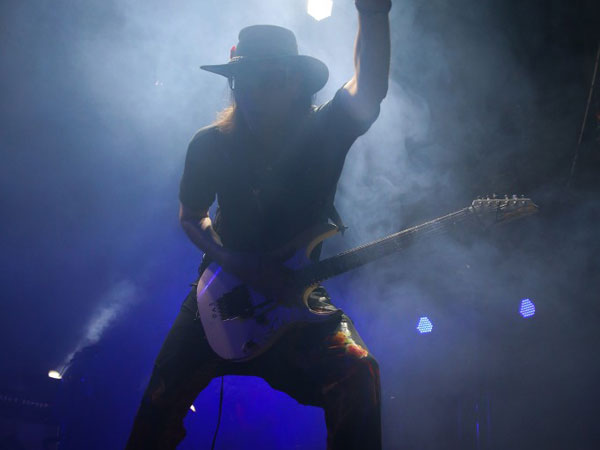Steve Vai's 11 tips for guitarists
"You'll be criticised no matter what"

Introduction
In his 35-year career, blur-fingered New Yorker Steve Vai has given instrumental guitar a good name and raised the technical bar to where other virtuosi fear to tread. Now, as he returns with a new live release, Vai talks pressure, misconceptions and the dangers of listening to your critics...
"Vai isn't just a surname. It's a byword for virtuosity, chops and the kind of technical prowess that makes eyes pop and jaws clank open"
Vai isn't just a surname. It's a byword for virtuosity, chops and the kind of technical prowess that makes eyes pop and jaws clank open. Practising for an unfeasible nine hours each day as a teenager, honing his craft at the Berklee College Of Music and hitting the radar in 1980 as Frank Zappa's so-called stunt guitarist, there's no doubt that Vai, in his own words, can "tear it up".
Yet it was 1990's solo breakthrough, Passion And Warfare, that revealed the New Yorker's flair for melody and mood, with classics such as For The Love Of God helping him transcend his natural audience of axe obsessives. Now, aged 54, Vai's latest live release, Stillness In Motion, proves he can still do it for real in the age of AutoTune.
"I always loved the idea of having command of the instrument," he tells us, "so there's an effortless, flowing, virtuosic, ripping, elegant approach that's beautiful, baffling and fulfilling for the people watching..."

Every gun slinger has to grow up
"There was a time when I put a lot of pressure on myself to be the guy that was able to blow everybody away.
"I'm not a perpetual shredder. I don't do it for my whole show. I never did"
"There was a period when something in me said every song should, at some point, have some kind of display of my chops. But you go through changes whenever you do something for a long time. Your perspective changes.
"After time, you shift, and the songs would tell me what they needed. At times, there's still a little bit of pressure, because a lot of people just want to see me tear it up. I do some of that. But I'm not a perpetual shredder. I don't do it for my whole show. I never did."

Impulse is overrated
"When I record a solo, sometimes I just play one pass, on the fly, and see what happens. But what I usually do is play something a bunch of times.
"When I sit and work on something, I raise the bar"
"Like, I'll sit and take one section, loop it, and play over it until something bizarre and interesting and quirky and lyrical comes out. It's like a meditation.
"If I take four bars of a solo section and loop it for two hours, and just search for something, then it's an investment of attention and from it comes something deeper.
"If I just hit record, something will come out, and it could be inspired or it could be crap. But when I sit and work on something, I raise the bar."

Go deep
"I always knew that one day I'd come up with a blues album; the emotions are about human experience, something we all share.
"I'm beginning to feel pressed for time"
"I'm beginning to feel pressed for time and that I should produce anything I want to see out there - like my book and this album - while I still have the energy!"

The bar is really high
"Modes are just colours. They're harmonic atmospheres. If you say the word ‘Mixolydian' to me, it's not a scale any more, it's an atmosphere. Same with ‘Super Locrian'.
"I can give you the academic breakdown of a scale, but it's really a colour and it create its own moods"
"Whatever scale you say, sure, I can give you the academic breakdown of what it is, but it's really a colour and it create its own moods.
"If I could only play in one mode? [laughs] Well, some people think I do only play in one mode. I'm very fond of the Lydian mode, and the Lydian #5."

Technique isn't just about speed
"When most people say ‘technique', they're referring to fast playing. But technique goes much deeper than that.
"Technique is a big word that people have homogenised"
"It's the control of all aspects. It's how you pick. It's where you pick. It's your tone. It's the way you bend notes. It's the way you vibrate them. It's your ability to be really dynamic: really soft then really loud.
"On my last record, The Story Of Light, there's a piece of music called Creamsicle Sunset. There's incredible technique on that - but no fast playing whatsoever.
"People say to me, ‘I was waiting for you to break loose.' But they're completely missing the point. The technique is in the bends with the bar, in the chords, the vibrato - that's where I applied the intense technique. Technique is a big word that people have homogenised."

It's all in your mind
"A guitarist's tone is in their head. It's the product of the way that they hear themselves.
"When I designed the JEM 30 years ago, it was out of my desire to do that the other guitars were limited at"
"For some people, that means it's in the equipment, because if it's in their head that their tone is in the equipment, that's where they're gonna be looking for their tone: in their equipment.
"But if it's in their head that their tone is in their fingers, then that's where they're gonna be looking for it: in their fingers.
"When I designed the JEM 30 years ago, it was out of my desire to do things that the other guitars that were available were limited at. It's definitely helped to create my idiosyncratic style."

Be unique
"I had such great musical role models when I was a kid during the 70s. I was a huge fan of Zeppelin, Queen, Hendrix, Deep Purple, Jethro Tull: very cool, progressive rock stuff.
"When I actually wrote my own music, I was only looking for things that were unique to me"
"I tried to learn every Zeppelin song. I cut my teeth on chord playing through listening to that beautiful flourishing chord soloing that Hendrix did. But I always drew a line. I never felt compelled to follow any one artist or style.
"First of all, I never thought I'd ever be good enough. Also, it was just a natural pull to be more interested in things I could play that were unique to me.
"So I'd play my Hendrix and my Page. I'd try to sound like Brian May, Carlos Santana, Al Di Meola, John McLaughlin, Joe Pass. But when I actually wrote my own music, I was only looking for things that were unique to me - which were obviously built upon all of those influences."

Lessons aren't for geeks
"That's an antiquated way of thinking. Everything you do is a f **king lesson. If you're gonna sit and learn a Led Zeppelin song, you're taking a lesson.
"I see a lot of players hit brick walls because they never had a little guidance on technique"
"And you know what? I see a lot of players that hit brick walls because they never had anybody to give them just a little guidance on technique, or in some simple music theory that'll really help you, like, knowing the names of the chords and the notes on the guitar.
"I took lessons from Joe Satriani, and whenever he put his fingers on the guitar, whether he was playing scales or showing me an exercise or a Bad Company song - it was enchanting. I would look at his fingers, and they just looked so beautiful on the guitar. It was just a special touch. That had a big impact on me. Still does."

It takes two
"Collaborating is actually more intimate than most relationships. We all have relationships with our parents, children, friends, co-workers, siblings, lovers - but when you go into a relationship with another songwriter, it's different.
"An illusion that people have about Frank Zappa is that he'd push you. Frank didn't push. Frank allowed you to give"
"When you collaborate to write music, the best thing you can do is to accept somebody for who they are and let them feel able to express themselves. And they will do the same thing for you. And that's how all the good s**t starts to happen.
"An illusion that people have about Frank Zappa is that he'd push you. Frank didn't push. Frank allowed you to give. He was like a magnet. He didn't push - he pulled.
"Frank allowed you to be the best you could be, at things you didn't even know you were good at. He recognised my ability to play complex guitar parts and transcribe complex music, and he said, ‘Okay, here's a platform...'"

Ignore the critics
"There's times when I enjoy playing fast. I always loved the idea of having command of the instrument, so there's an effortless, flowing, virtuosic, ripping, elegant approach that's beautiful, baffling and fulfilling for the people watching.
"You'll be criticised no matter what. But the bottom line is, that will eventually fade away
"Why not? It's a beautiful thing to see, y'know, and people really enjoy that, and as long as my fingers are capable of doing it, and it works in a piece of music, I'm gonna do it. And there's nothing that can stop that, no matter what anybody says or thinks about it.
"That's a beautiful point that I hope gets across. Do what you want if it feels right, regardless of what anybody thinks. Now, when you're doing that, a lot of times, you might feel resistance or agitation.
"You'll be criticised no matter what. But the bottom line is, that will eventually fade away, as long as you just stick to what you really enjoy doing."

The guitar is infinite
"If you can even conceive of the idea that everything that can be played on the guitar has already happened, then you're really missing the point of what the creative process is.
"The process of creation in any field is infinite. Nothing is gonna run out"
"The process of creation in any field is infinite. Nothing is gonna run out. That's like telling the universe that it's not infinite. It's like saying, ‘Okay, this is the end of time and space...'"
Stillness In Motion: Vai Live In LA is out now on CD and DVD, from Sony Music Entertainment and Legacy Recordings

